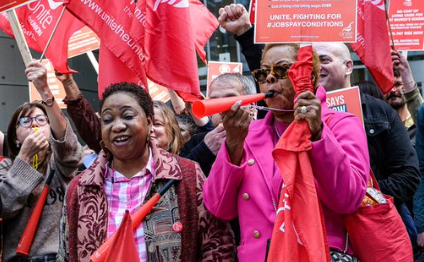Vacancies are mounting up as salaries being offered by charities fail to keep up with inflation and attract candidates to the sector, latest figures have revealed.
Strike action is also continuing in the sector amid disputes between staff and management over low pay, most recently at homelessness charity St Mungo’s.
The research has been published by online recruiter CharityJob which found there are “far more job vacancies than candidates available to fill them”.
The number of jobs posted on its website increased by 35% between 2019 and 2022, with 61,900 job vacancies being posted. Meanwhile, demand for jobs among candidates has fallen, with 13% fewer clicks being made to apply for roles compared to pre-Covid pandemic levels.
A drop in salaries amid the cost-of-living crisis is a factor in this “candidate driven market”, the research suggests.
The average salary for a role posted in 2022 was £34,800, a 3% drop on figures for 2019.
Where increases are taking place, they are largely failing to keep pace with inflation, which hit double digits over the last year and currently stands at 8.9%.
Researchers found that the average salary being offered for fundraising roles increased by just 4% between 2019 and 2022.
Over the same period the increase in salaries for admin, business services and finance roles are up only 2% and for marketing, PR, digital and operations roles the increase is 3%.
Increases in salaries for human resources, policy, advocacy, governance and campaigning roles are faring better but still below inflation at only a 7% rise since 2019.
Support worker role salaries are up 13% over the last three years but are still low on average compared to other charity sector roles. The average entry level support worker salary is between £22,500 in small charities to £23,200 in larger organisations.
Charity Job says: “Offering fair salaries is essential for recruiting top talent, as well as for promoting diversity, equality, and inclusion.”
The number of vacancies is highest among policy, advocacy, governance, campaigning, administration, marketing, PR and digital roles.
Strike action
Low salaries have already prompted a wave of strike action across the charity sector, including at homelessness charity St Mungo’s.
Workers at the charity belonging to the union Unite have this week criticised a “pitiful new pay offer” from St Mungo’s management.
They say St Mungo’s have added “insult to injury” by increasing an original pay offer from 1.75% to 2.25%.
The new pay offer was rejected by a margin of 91% in a ballot amid the pay dispute, which dates to 2021. The month-long strike will begin on 30 May and end on 26 June.
Meanwhile, the union claims that the average CEO pay at the charity has risen by 77% since 2013. According to the charity’s latest accounts the CEO role at the charity as of the end of March 2022 was paid £189,418, including pension contributions, which is a 5% increase on the previous year.
“Charity workers who are on the streets helping the homeless are now prepared to go on strike for a month for a decent wage,” said Unite general secretary Sharon Graham.
“This shows what they think of the way they’ve been treated by St Mungo’s management. The pitiful pay offer has just made everyone in the union angrier.
“So if the management at St Mungo’s want to avoid a month long strike they have the answer in their own hands. Make Unite members a decent pay offer. Their indifference to the financial pressures facing their own staff is quite frankly astonishing.”
A four-week strike at the charity had been suspended while workers considered the new pay offer, which Unite had recommended workers rejected.
“Charity workers who are on the streets helping the homeless are now prepared to go on strike for a month for a decent wage. This shows what they think of the way they’ve been treated by @StMungos’ management.” @UniteSharon https://t.co/wWncz3AwJF
— Unite the union: join a union (@unitetheunion) May 10, 2023
However, St Mungo’s has disputed the union’s publicly released pay offer figures saying that the 1.75% pay rise was in 2021/22 and the latest amount offered is on top of a further pay rise for this year and as it looks to “focus on staff on lower salaries”. It claims that staff earning up to £25,000 were expected to see a 10% uplift.
"We are naturally very disappointed our new offer has been rejected by Unite the Union's members and that an unprecedented 28 days of strike is due to commence from 30 May to 26 June 2023,” said a charity spokesperson.
"We have compromised and tried everything possible to reach a reasonable negotiation and avoid strike action, and we believe our new offer was fair and appropriate. Our lines of communication with Unite will remain open as we continue to try to resolve the dispute.”
The spokesperson added: "Our priority is to continue supporting our clients and people experiencing or at risk of homelessness. We have contingency plans in place to minimise the risks to our clients; however, are concerned about the impact prolonged strike action will have on our service users, who are some of the most vulnerable people in our communities.”
Unite workers at Shelter had also been embroiled in a long running dispute over pay and a fortnight of strike action had been planned over winter. But this was averted after a revised offer of a 7% pay increase was accepted.
Red Tape
Another barrier impacting on candidates applying for charity sector roles is the red tape involved in recruitment.
The recruiter found that “having to complete long application forms” was a complaint made by almost three in five (59%) of candidates. Having to write cover letters was cited as a barrier by two in five (40%). More than a third (34%) say jobs have too many requirements.
Other concerns raised are a lack of transparency, accuracy and feedback from charities.
More than half (54%) complain that recruiters do not respond to candidates if they are not successful in securing an interview. Just under three in ten say that salaries do not match responsibilities being asked for, not offering interesting enough roles or lack transparency in hybrid or flexible options.
Hybrid working
The research also reiterates the increase in hybrid working options post pandemic.
Only around half of roles (53%) are on site, with 35% advertised as hybrid and 12% promoted as remote working. In 2019 almost all roles (96%) were required candidates to work on site.
Smaller charities are more likely to offer hybrid working, while six in ten large charities advertise jobs as on site.
Candidates are keen to see flexible options offered, with six times as many clicks on remote working roles than those on site.
Charities are also able to offer higher salaries for hybrid and remote workers. Salaries for these roes increased by 18% between 2019 and 2022. Over the same period the average salary for on site roles dropped by 5%.
Candidates “highly value the flexibility that some jobs in the charity sector offer. Remote roles are in very high demand, with six times the number of clicks on apply than on-site roles, and hybrid roles also twice as popular as on-site jobs. Charities should look to offer more flexible ways of working to attract candidates.”
Figures released by the Chartered Institute of Fundraising and CharityJobs last month found that 52% of all advertised fundraising jobs are hybrid.













Recent Stories